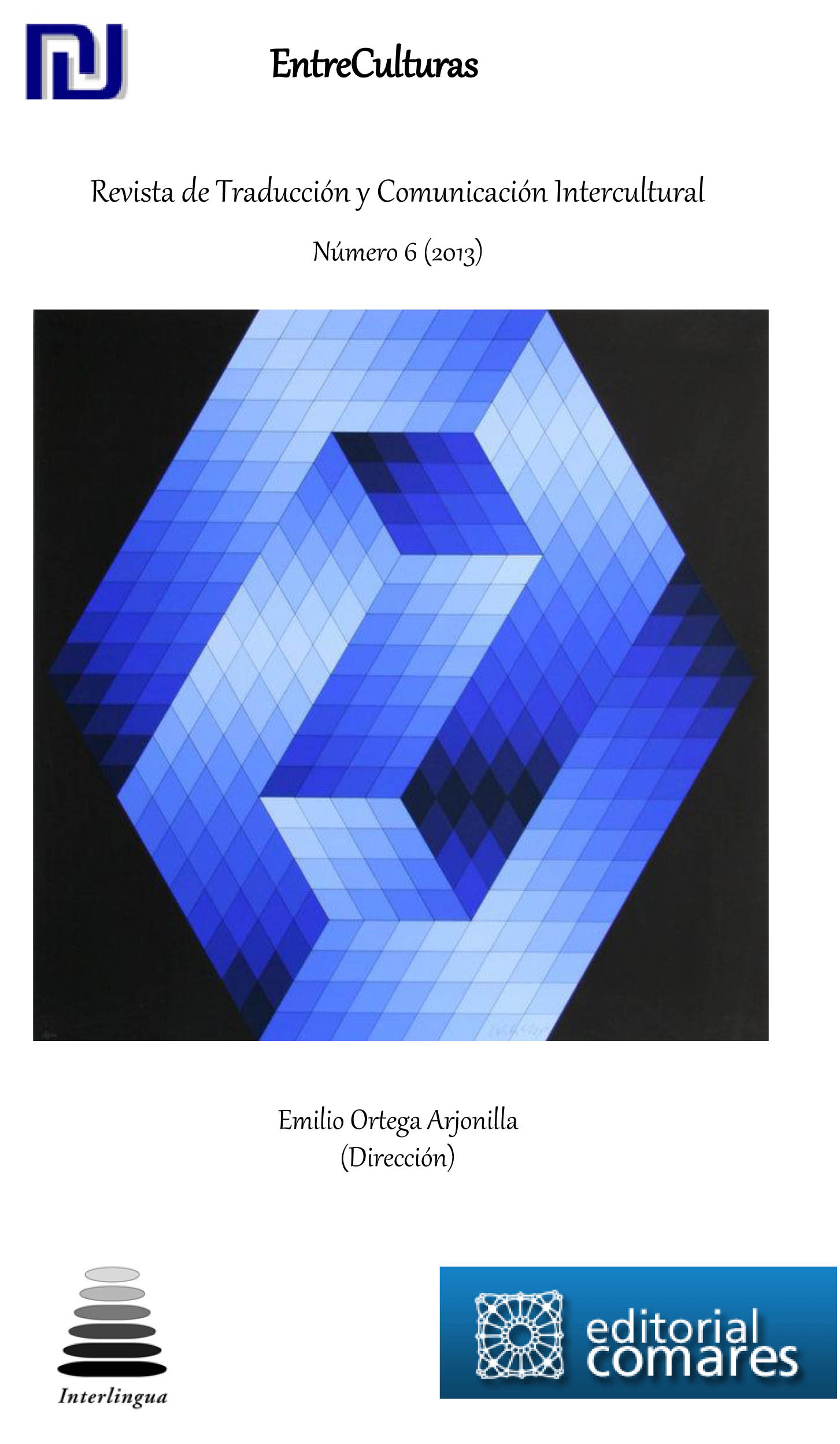DIDACTIQUE DE LA TRADUCTION À L'UNIVERSITÉ: RÉFLEXIONS SUR QUELQUES ÉLÉMENTS DE BASE
DOI:
https://doi.org/10.24310/Entreculturasertci.vi6.11527Keywords:
translation teaching, linguistic theory, interpretative theory, communicationAbstract
The term ?theory? consists of an intelectual conception that?s structured on hypothetical or synthetic trends. Practically speaking, it comes from what is empirical, experimental and pragmatic; it is the realization of the translating activity. These explanations lead us to ask and wonder about how to carry on to make the student be able to methodically construct his/her translated knowledge and savoir-faire (know-how). In other words, it leads to a reflection on the translation theories and their contribution to the teaching/learning of translation at the university. Talking about theories of translation, it is categorized under Translation Studies. For this reason, we write out reflection in a methodological framework seeking conceptual analysis through questioning the concept of contrastive linguistics, the cognitive process of translation, of understanding de-verbalisation and re-expressing.
Downloads
Metrics
References
DICTIONNAIRES
Le Nouveau Petit Robert, 1994.
OUVRAGES ET ARTICLES :
AUSTIN, JOHN-LANGSHAW (1970): Quand dire, c'est faire: how to do things with words. Introd. et trad. par Gilles Lane, Seuil, Paris.
BALLARD, MICHEL (1988): « Le commentaire de la Version », in Méta, Vol. 33.
BELLEGER, LIONEL (1981): L’expression écrite. Presses universitaires de France, Paris
CHARAUDEAU, PATRICK (1992): Grammaire du sens et de l’expression ; éd. Hachette Education, Paris.
ISRAEL, FORTUNATO ET LEDERER, MARIANNE (2005): La théorie interprétative de la traduction ; Textes réunis et présentés par Fortunato Israël et Marianne Lederer. Paris: Lettres modernes Minard.
LAROSE, ROBERT (1992): Théories contemporaines de la traduction, éd. Presses de l?université du Québec1989, 2ème impression.
LEDERER, MARIANNE (1994): La traduction aujourd’hui, le modèle interprétatif. Ed. Hachette, 1994.
MAINGUENEAU, DOMINIQUE (2005) : Analyser les textes de communication. Ed. A. Colin, Paris.
MOIRAND, SOPHIE (1982): Enseigner à communiquer en langue étrangère, éd. Hachette.
MOUNIN, GEORGES (1963): Les problèmes théoriques de la traduction, Gallimard, Paris.
NIQUE, CHRISTIAN (1975): Grammaire générative : hypotèse et argumenattion; A. Colon PICOCHE, JACQUELINE (1977): Précis de lexicologie française : l’étude et l’enseignement du vocabulaire. 1ère édition 1977 ; éd. Nathan 1992.
REY-DEBOVE, JOSETTE (1997): Le Métalangage : étude linguistique du discours sur le langage. Ed. A. Colin, Paris.
SAKHI, MOHAMED (2006): « Linguistique et enseignement de la traduction », in Traductologie(Turjumiat) N. 1, Ed. Racines Rabat. Maroc.
SELESKOVTICH, DANICA ET LEDERER, MARIANNE (2001): Interpréter pour traduire. Editions Didier, Paris.
WIDDOWSON, HENRY GEORGE (1991): Une approche communicative de l’enseignement des langues, éd. Didier.
Downloads
Published
How to Cite
Issue
Section
License
All contents published in Entre culturas. Revista de traducción y comunicación intercultural are protected under the Creative Commons Attribution-NonCommercial-ShareAlike 4.0 International (CC BY-NC-SA 4.0) license. All about this license is available in the following link: <http://creativecommons.org/licenses/by-nc-sa/4.0>
Users can copy, use, redistribute, share and exhibit publicly as long as:
- The original source and authorship of the material are cited (Journal, Publisher and URL of the work).
- It is not used for comercial purposes.
- The existence of the license and its especifications are mentioned.
There are two sets of authors’ rights: moral and property rights. Moral rights are perpetual prerogatives, unrenounceable, not-transferable, unalienable, imprescriptible and inembargable. According to authors’ rights legislation, Entreculturas. Revista de traducción y comunicación intercultural recognizes and respects authors moral rights, as well as the ownership of property rights, which will be transferred to University of Malaga in open access. The property rights are referred to the benefits that are gained by the use or the dissemination of works. Entreculturas. Revista de traducción y comunicación intercultural is published in an open access form and it is exclusively licenced by any means for doing or authorising distribution, dissemination, reproduction, , adaptation, translation or arrangement of works.
Authors are responsable for obtaining the necessary permission to use copyrighted images.





7.png)
